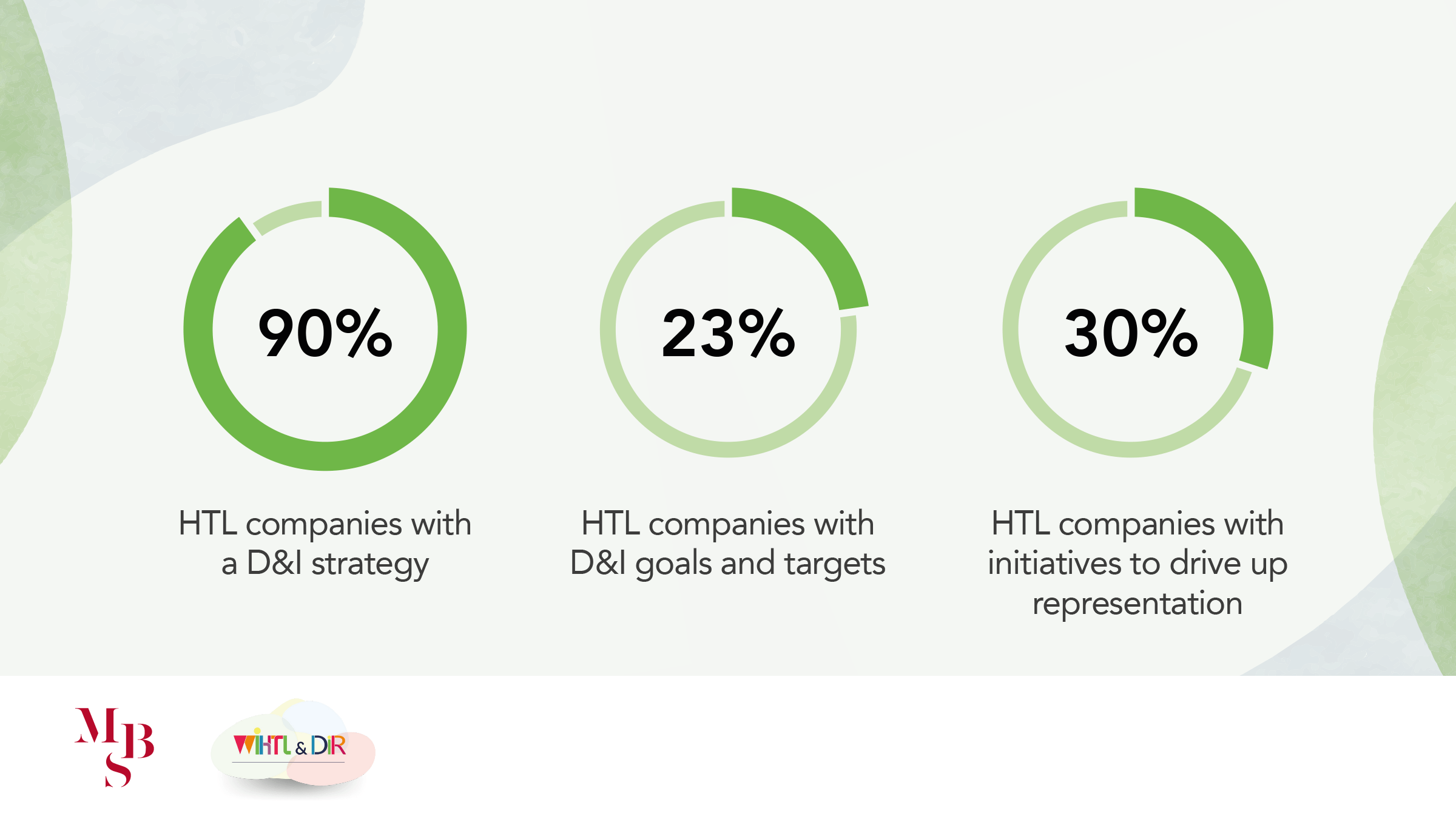It hard to believe that MBS is now in the sixth year of partnership with WiHTL & DiR to help the hospitality, travel and leisure sector become more diverse. In preparation for this year’s Inclusion Summit, I was flicking through the 2019 edition of our joint D&I report: “There’s a need for the industry to come together,” I wrote in the executive summary, “to collaborate to find sector-wide solutions to diversity challenges.” Fast-forward nearly four years, and I can confidently say that businesses across HTL are doing exactly that!
On Tuesday of this week, it was deeply inspiring to be joined by more than 600 leaders for WiHTL and DiR’s annual Inclusion Summit, bringing together senior executives from across both HTL and retail to discuss how to drive meaningful change on diversity and inclusion. Over the course of ten panels and addresses at the iconic Hilton on Park Lane, we heard from Chairs and non-executives, CEOs and chief people officers, and leading D&I experts like June Sarpong OBE and gold medal-winning Paralympian, Aaron Phipps MBE.
It’s clear that the business case for D&I is well understood, and that leaders in HTL and retail are deeply committed to making this a priority. Standing in the foyer and overhearing the enthusiastic conversations being held between industry peers, it was amazing to see how far we’ve come since MBS’ journey with WiHTL began. As Tea Colaianni, founder and Chair at WiHTL & DiR, said in her opening remarks: “today, most leaders across our industry are committed to growing, evolving and embedding evidence-backed EDI strategies and are reaping the benefits of fostering an inclusive culture” – this definitely wasn’t a given at the start of our journey.

Throughout the day it was exciting to hear from so many leaders who were unequivocal about the ways D&I had improved their organisation. “There’s no question that D&I has transformed our business,” said Simon Vincent CBE, EVP & President EMEA at Hilton and our host for the event, in his opening remarks: “It has empowered individuals and fostered creativity – and we’ve seen evidence of this in spades.”
Speaking in a panel of CEOs, David Wood, chief executive at Wickes, spoke to the power of D&I in attracting talent: “If you’re an inclusive business, you open yourself up to a much broader talent pool,” he said. “All I want is for people to look at Wickes from the outside in and see people like them.” The panel agreed that this is especially critical in our current macroeconomic climate. “Today, the most scarce resource we have is talent,” mulled Ian Carter, Chair at Watches of Switzerland Group, “so we have to have a culture that people want to be a part of.”
“Today, the most scarce resource we have is talent, so we have to have a culture that people want to be a part of.” – Ian Carter, Chair, Watches of Switzerland Group.
But how to achieve this? Throughout the day, it was invaluable to hear insight on the holistic thinking leaders should be undertaking, as well as the practical interventions that can be made to foster a more inclusive place to work.
Paula Mackenzie, CEO at PizzaExpress, for example, shared a philosophy that she has applied throughout her career: to leave things better than she found them. “And this can be achieved at every level,” she said, “you don’t have to be the CEO.” And when it comes to actionable steps, it’s clear that small changes can make a huge impact.
Kari Daniels, CEO UK & Ireland at SSP, recalled a very practical intervention she had made in her previous role as CEO of Tesco in Ireland. When Kari assumed the role, store managers were required to open stores at 7am every day. She described a woman colleague with a young baby having to engage in a 45-hour working week, dropping her baby off with her mother every day at 6am so she could open the store, and regularly being called out at night to deal with security alarms.

“I was staggered,” Kari said, “all it took was some basic interventions – outsourcing night-calls to third-party security companies, getting deputy managers to open the stores, and bringing in job shares, for example – to make a real difference to the lives of women leaders in our business.”
Estelle Hollingsworth, CPO at Virgin Atlantic, shared a similarly practical step taken by the airline business. “We did something small, we relaxed our tattoo policy for cabin crew,” she told the audience, “and because of that one change, we saw applications increase by 520%.”
Fostering a truly inclusive culture involves engaging all teammates. Paul Flaum, CEO at Bourne Leisure, told us that managers at Bourne are given training on how to speak openly with their teams, and on how to build a workforce where everyone can be themselves. “We’ve spent a lot of time on this,” he said. “We’re upskilling our leaders so they can truly understand their people through asking personal questions and facing up to their own unconscious bias.”
Indeed, unconscious bias still plays a big role in leadership today. Prerana Issar, CPO at Sainsbury’s, spoke passionately on why the habit of hiring in one’s own image is blocking progress on diversity at the most senior levels: “Just 4% of CEOs in the FTSE 350 are women,” she observed. “In fact, there are more CEOs named John or Steven than there are women CEOs. Changing what the ‘norm’ looks like in an organisation is a long-term project.”
“Changing what the ‘norm’ looks like in an organisation is a long-term project.” – Prerana Issar, CPO, Sainsbury’s.
Our 2023 research into D&I in HTL and retail reflects this notion. As I told the audience in my opening presentation, there’s been no meaningful change on the proportion of women or people of colour in leadership roles since last year, and the most senior strategic positions of Chair, CEO and CFO are still overwhelmingly held by men. Today, just:
– 6.5% of Chairs across HTL and retail are women
– 11% of CEOs in HTL and 12.5% of CEOs in retail are women
– 13.5% of CFOs in HTL and 7% of CFOs in retail are women
To move the dial, urgent and deliberate action is needed. Businesses should be setting targets, and linking leadership bonuses to progress on representation – but at present, fewer than half of companies in HTL and retail have any specific initiatives in place to drive up the representation of minority groups, and only a third have any measurable goals in place.

In her fireside chat with Tea, June Sarpong OBE reflected on this. “I say to leaders: every successful organisation has goals, and every business imperative has targets – so why aren’t you setting them for D&I? If you haven’t set a goal, you don’t know what success looks like.”
As David Woods articulated, it’s time to turn momentum into movement – and this is the sentiment we tried to articulate through the title of our 2023 report “Accelerating the pace of change”.
I left the Inclusion Summit feeling hugely inspired by the collective drive of leaders in HTL and Retail, and by the power of the WiHTL & DiR collaboration community to positively galvanize our sectors. But as we approach the end of 2023, I hope the next year brings a renewed focus on increasing representation. While the inclusion activity in place in HTL and retail is truly gaining momentum, our industries need more women and ethnically diverse role models at the very top levels for us to see lasting – and meaningful – change.








